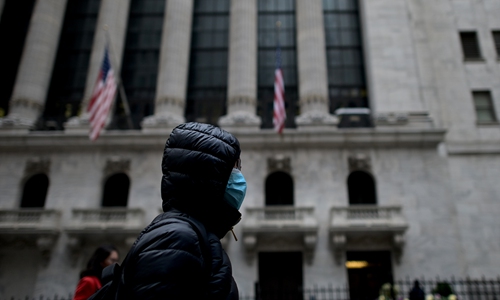HOME >> OPINION
US political system stymies effective virus response
Source:Global Times Published: 2020/2/26 10:38:40

A woman with a facial mask passes the New York Stock Exchange (NYSE) on February 3, 2020 at Wall Street in New York City. Photo:AFP
The novel coronavirus pneumonia (COVID-19) epidemic is spreading around the world and testing many countries' disease prevention system. There is still a high risk of a flash point of the epidemic spreading globally, but some countries have been slow in responding. The US is one of them.The US online news portal Politico published an article on February 20 headlined "Problems with CDC coronavirus test delay expanded US screening," using the abbreviation of the US Centers for Disease Control and Prevention. The report expressed concerns that the "delay could impede the US government's ability to detect scattered cases before they snowball into larger outbreaks."
The US government is not that willing to take over the hot potato, and we can see that through the country's moves in taking back persons on board the Diamond Princess cruise ship. US President Donald Trump was infuriated that 14 Americans who tested positive for the virus were permitted to return.
Another reason the US was slow to respond is it doesn't believe the COVID-19 would spread in the country. The US believes, as the most powerful country of the world with developed medical system and advanced technology, it won't be impacted by the epidemic. As a result, the US government has not taken a very serious attitude toward the epidemic.
According to the latest data from the CDC, there are 35 confirmed cases in the US, including three repatriated from China's city of Wuhan and 18 from the cruise ship. The CDC said it will begin testing people who report flu-like symptoms for COVID-19 at public health labs, the magazine Infection Control Today reported, implying there could be more cases then have been reported in the US "since flu symptoms and some of the symptoms of the novel coronavirus are the same."
However, no matter the accurate number of infected cases in the US, it is clear that if the federal government and local governments cannot take effective measures, there could be a severe outbreak of the epidemic in the US, and this will undoubtedly impact the country's economy, society, and people's livelihood.
China has been engaged in the frontline of battle against the COVID-19. Various effective measures have been taken in China, and so far about 38 percent of the infected have been cured.
China has acted as a responsible big country, timely sharing information with the World Health Organization and other countries and providing precious knowledge for them in epidemic prevention and control.
Nonetheless, due to ideological and political prejudice against China, American elites don't believe China's moves and experience are reliable and helpful.
On the other hand, during the communication between China and the US on the COVID-19, Washington cannot get rid of its deep-rooted mind-set and has thus politicized this public health emergency. The US cannot calmly and objectively view China's efforts in epidemic prevention and control, although China has clearly emphasized the seriousness of the COVID-19. As a result, the US' prevention and control operation has been affected.
The US didn't take the COVID-19 seriously but regards it an opportunity to attack China. This has hindered the US government from timely responding and to some extent influencing the American people's knowledge of the COVID-19. People's viewpoints then affect the attitude of senators in the electoral districts which they represent. Hence, a public health emergency could eventually turn into a political game. But it is the American people who will bear the consequence of severe political polarization in US politics.
Only three of the more than 100 public health labs across the country have been verified to use the screening test offered by the CDC, Politico reported. In addition, HHS would "exhaust existing funding for its response to the virus," but it would have to wait a long time before appropriation can be delivered considering the US is in electoral year with fierce bipartisan competitions. This is undoubtedly unfavorable for epidemic prevention and control.
Such a dilemma once again reflects the flaws in US governance system, which is not capable of giving a timely and effective response to the COVID-19.
The US is likely to face fierce challenges. It is possible that when China has already completed its epidemic prevention and control, the US will have just started to psychologically prepare to face the COVID-19. The US will certainly continue its prevention and control operations, but it is likely a difficult mission.
The article was compiled by Global Times reporter Xu Hailin based on an interview with Li Haidong, a professor with Institute of International Relations, China Foreign Affairs University. xuhailin@globaltimes.com.cn
RELATED ARTICLES:
Posted in: VIEWPOINT